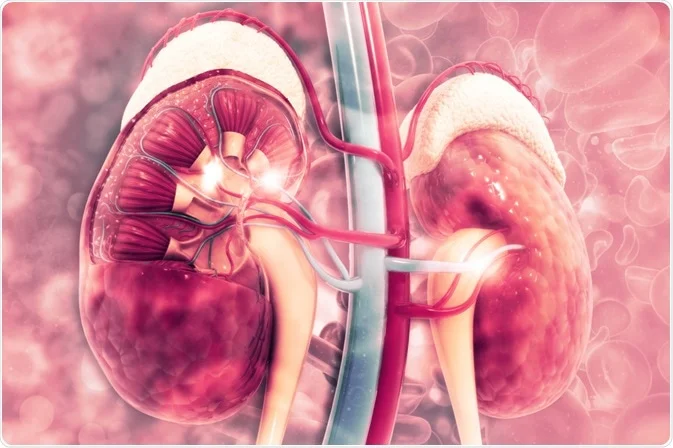Introduction
Creatinine is a waste product formed during muscle metabolism in the body. It is primarily filtered out of the blood by the kidneys and excreted in urine. Monitoring creatinine levels is crucial because elevated levels can serve as an early warning of kidney dysfunction or disease. In this article, we will explore how high creatinine levels can lead to chronic kidney disease (CKD) and the underlying mechanisms and consequences of this connection.
Table of Contents
Creatinine Levels in the Human Body
Creatinine levels in the blood provide valuable insights into kidney function. Healthy kidneys effectively filter out excess creatinine, maintaining stable blood levels within a normal range. However, when the kidneys are damaged or their filtration capacity is compromised, creatinine accumulates in the bloodstream, resulting in elevated levels. However, by controlling creatinine levels, you can maintain a healthy kidney function. There are vegetables and fruits to control creatinine levels. There are workout routines and lifestyle practices too that help you maintain healthy creatinine levels.
The Link Between High Creatinine and Chronic Kidney Disease
High creatinine levels are often one of the earliest indicators of kidney dysfunction or damage. Here’s how elevated creatinine levels can lead to chronic kidney disease:
Impaired Filtration
Chronic Kidney Disease is a progressive condition caused by a gradual dysfunction of the kidney over time. In the early stages, the kidneys may still be able to filter creatinine, but not as efficiently as before. This leads to an increase in creatinine levels in the blood, which can serve as an alert that kidney function is compromised.
Altered Glomerular Filtration Rate (GFR)
Creatinine levels helps to calculate the glomerular filtration rate(GFR), a measure to check how the kidneys filter waste from the blood. As creatinine accumulates in the bloodstream due to impaired filtration, the GFR decreases, reflecting declining kidney function.
Persistent High Creatinine
If the underlying cause of elevated creatinine levels is not addressed, the kidneys continue to deteriorate. Over time, the high creatinine levels become persistent, indicating ongoing kidney damage.
Stages of Chronic Kidney Disease
Elevated creatinine levels are used to diagnose and stage Chronic Kidney Disease. Chronic Kidney Disease is categorized into five stages, with stage 1 being the mildest and stage 5 representing end-stage renal disease (ESRD). High creatinine levels are particularly indicative of stages 3, 4, and 5 of Chronic Kidney Disease, where kidney function is significantly impaired.
Consequences of Untreated Chronic Kidney Disease
Untreated Chronic Kidney Disease can lead to various complications, including high blood pressure, electrolyte imbalances, anemia, bone problems, and cardiovascular issues. As kidney function further deteriorates, it may progress to ESRD, where the kidneys can no longer sustain life without dialysis or a kidney transplant.
Management and Prevention
Preventing chronic kidney disease (CKD) or slowing its progression involves managing creatinine levels and overall kidney health. Creatinine is a waste product produced during muscle metabolism and is filtered by the kidneys. Elevated creatinine levels can indicate kidney dysfunction. Here’s how you can prevent chronic kidney disease by managing creatinine levels:
Limit Protein Intake
While protein is essential, excessive consumption can increase creatinine levels. Moderation is key. Consult with a doctor or dietitian to find out an appropriate protein intake based on your needs.
Manage Sodium
High sodium consumption can increase the body’s blood pressure and strain the kidneys. Reduce salt intake, avoid processed foods and excess salt during cooking and at the table.
Balance Diet
Consume a well-balanced diet by including fruits, vegetables, whole grains, and lean proteins. These foods provide essential nutrients while supporting overall health.
Stay Hydrated
Adequate Fluid Intake: Staying well-hydrated helps maintain the proper concentration of creatinine in the blood and supports the kidneys in eliminating waste. Drink enough water throughout the day, and adjust based on activity level and climate.
Control Blood Pressure
High blood pressure is a cricial risk factor for chronic kidney disease. Monitor your blood pressure regularly, and work with your healthcare provider to maintain it within a healthy range through lifestyle changes and medication if necessary.
Manage Diabetes
Diabetes is another major risk factor for chronic kidney disease. If you have diabetes, control your blood sugar levels through diet, exercise, and medications as prescribed by your healthcare provider.
Avoid Overuse of Medications
Certain medications, such as nonsteroidal anti-inflammatory drugs (NSAIDs), can harm the kidneys. Use these medications sparingly and only as directed by a healthcare provider.
Exercise Regularly
Regular physical activity supports overall health, maintains muscle mass, and promotes kidney function. Practice 150 minutes of moderate-intensity aerobic exercise per week, supplemented with strength-training exercises.
Avoid Smoking and Excessive Alcohol
Smoking and alcohol intake can result in kidney damage. Quit smoking and limit alcohol intake to protect your kidney health.
Regular Health Check-ups
Schedule redular health check-ups with your healthcare provider to monitor kidney function and creatinine levels. Early detection of kidney issues allows for prompt intervention and management.
Medication Review
Discuss your medications with your doctor to avoid any complications. Adjustments to medication dosages may be necessary based on your creatinine levels and kidney function.
Manage Other Health Conditions
Chronic conditions like heart disease, obesity, and high cholesterol can indirectly impact kidney health. Consult your doctor to manage these conditions effectively. Managing creatinine levels and preventing chronic kidney disease requires a holistic approach to kidney health. By maintaining a healthy lifestyle, staying hydrated, controlling blood pressure and diabetes, and avoiding potential kidney-damaging factors, individuals can reduce the risk of chronic kidney disease or slow its progression. Regular monitoring and consultation with healthcare professionals are essential for personalized guidance and early detection of any kidney-related issues.

Impact of Diet in Maintaining Creatinine Levels and Healthy Kidney Function
Diet plays an inportant role in maintaining healthy creatinine levels and supporting overall kidney function. An imbalanced diet can cause the accumulation of waste products and place additional stress on the kidneys.
Protein Intake
Balanced Protein Consumption: Protein is an essential part of a healthy diet, but excessive protein intake can lead to increased creatinine levels. Protein metabolism produces creatinine, so a diet high in protein can result in elevated creatinine levels. It’s important to consume an appropriate amount of protein based on your individual needs and consult with a doctor or dietitian for guidance.
Fluid Intake
Adequate Hydration: Staying well-hydrated is crucial for maintaining healthy kidney function. Proper hydration helps dilute the concentration of creatinine in the blood and supports the kidneys in flushing out waste products. Dehydration can lead to concentrated urine, potentially increasing the concentration of creatinine.
Sodium (Salt) Intake
Sodium Management: High sodium intake can raise blood pressure and strain the kidneys. Reducing salt intake helps maintain healthy blood pressure levels and reduces the risk of kidney damage.
Potassium Intake
Balanced Potassium Consumption: Potassium is essential for various bodily functions, including muscle and nerve function. However, individuals with kidney disease or impaired kidney function may need to limit potassium intake to prevent hyperkalemia (elevated blood potassium levels). High-potassium foods like bananas, potatoes, and oranges should be consumed in moderation or under the guidance of a healthcare provider or dietitian.
Phosphorus Intake
Phosphorus Management: High levels of phosphorus in the blood can result from kidney dysfunction. In such cases, it’s essential to limit phosphorus intake by avoiding high-phosphorus foods like processed foods, cola beverages, and dairy products.
Acidic and Alkaline Foods
Balanced Acid-Base Diet: The kidneys play a role in maintaining the body’s acid-base balance. Consuming too many acidic or alkaline foods can disrupt this balance. A healthy diet rich in fruits, vegetables, etc., can help maintain a proper acid-base equilibrium and support kidney function.
Healthy Fats
Omega-3 Fatty Acids: The healthy fats found in fish, flaxseeds, and walnuts contain omega-3 fatty acids, which may aid in reducing inflammation and lower the risk of kidney disease progression.
Weight Management
Maintaining a Healthy Weight: Obesity can increase the risk of kidney disease and other health-related problems. A balanced diet and regular physical exercise or activity help to maintain a healthy weight, reducing the risk of kidney-related issues.
Phytonutrients and Antioxidants
Consuming Antioxidant-Rich Foods: Fruits and vegetables are rich in antioxidants and phytonutrients that may protect the kidneys from oxidative stress and inflammation.
Diet plays an important role in maintaining healthy creatinine levels and supporting kidney function. A balanced and kidney-friendly diet, along with adequate hydration, can help prevent kidney disease, slow its progression, and promote overall well-being. Consulting with healthcare professionals and dietitians is crucial for individuals with specific kidney-related concerns or conditions.
Conclusion
High creatinine levels are an early warning sign of potential kidney dysfunction and chronic kidney disease. Understanding the link between elevated creatinine and CKD is crucial for early detection and intervention. By addressing the underlying causes and implementing timely treatments and lifestyle changes, individuals can potentially slow the progression of kidney disease, maintain kidney function, and improve overall health. Regular health check-ups and consultations with doctor are essential for managing high creatinine levels and mitigating the risk of CKD.


 Home
Home








